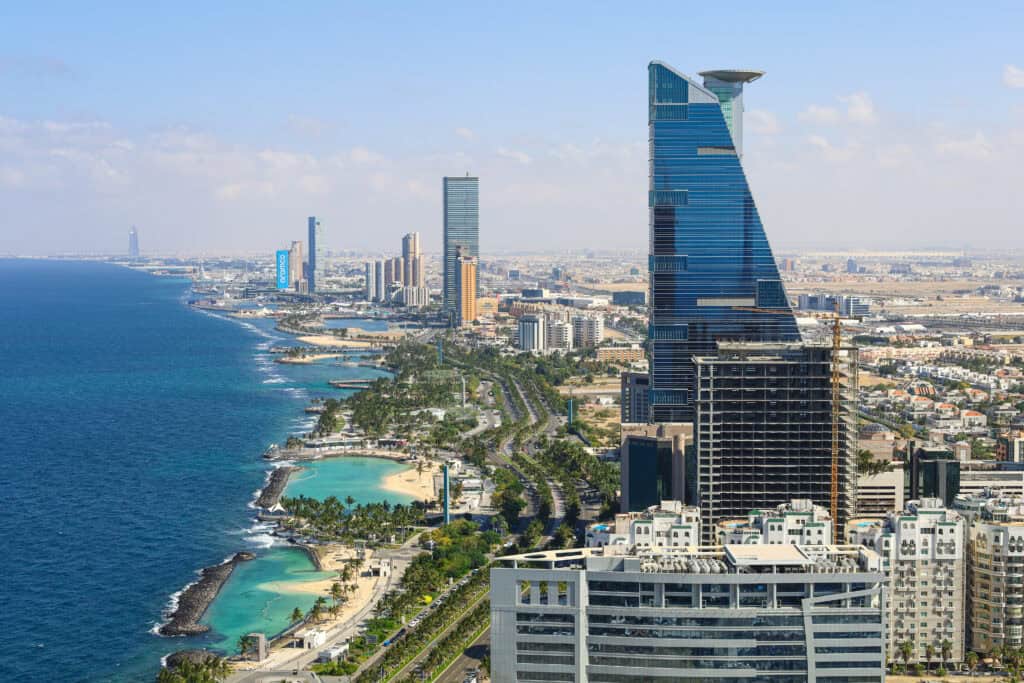A Complete Guide to Filing US Expat Taxes in Nigeria
April 28, 2025 | Blog | 14 minute read
Expat Tax Blog. Tax Tips for US Americans abroad.
Updated
 All blogs are verified by Enrolled Agents and CPAs
All blogs are verified by Enrolled Agents and CPAs
Updated
Nigeria is one of Africa’s largest economies, full of culture, natural beauty, and business potential. Its booming tech scene, energetic cities like Lagos and Abuja, and friendly local communities make it a great place for US expats to work, live, and even retire. A lot of Americans come for temporary assignments, but whether you’re just here for a short project, thinking about staying longer, or settling in for retirement, it’s important to get clear on your tax responsibilities. The US and Nigeria don’t have a tax treaty or totalization agreement, which can make things a bit more complicated. That’s why our US-Nigeria Expat Tax Guide is here to help you stay on top of your taxes and make the most of your time abroad.
Do Expats Need to File US Taxes?
US-Nigeria Expat Tax Deadlines
Nigerian Visas for US Citizens
Life in Nigeria: What to Expect as an Expat
Nigerian Tax System for US Expats
US-Nigeria Expat Tax Agreements
Nigerian Property for US Expats
Your US Expat Taxes Made Easy with MyExpatTaxes
Do Expats Need to File US Taxes?
No matter where you live in the world, if you meet the IRS threshold, you’ll need to file your US federal tax return (Form 1040).
In 2025, you’ll need to file your 2024 US taxes if:
| Filing Status | Income Threshold |
|---|---|
| Single | $14,600 |
| Married Filing Jointly | $29,200 |
| Married Filing Separately | $5 |
| Self-Employed | $400 |
| Qualifying Widow(er) | $29,200 |
| Head of Household | $21,900 |
FBAR & FATCA
That’s not the only filing requirement. The FBAR and FATCA are two separate US reporting requirements designed to track foreign financial accounts and assets held by US taxpayers living abroad.
If you hold foreign assets worth more than $200,000 as a US expat, FATCA requires you to file IRS Form 8938 to report them.
If your combined maximum balance of all foreign accounts exceeds $10,000 at any time during the year, you’ll need to file an FBAR with FinCEN form 114.
US-Nigeria Expat Tax Deadlines
Some expats underestimate the importance of meeting US-Nigerian Expat Tax deadlines — until penalties start adding up! Here are the key deadlines to add to your calendar.
The Nigerian tax year follows the calendar year, and returns are due within the following 90 days. When it comes to your US taxes, you have four key deadlines, including additional extensions available on request:
| Deadline | Date |
|---|---|
| Standard Filing Deadline | April 15th |
| Automatic Extension for Expats | June 16th |
| Deadline for Expats Filing an Extension (file by June 15th) | October 15th |
| FBAR Deadline for Expats | October 15th |
| Deadline for Expats if you Filed a Second Extension | December 15th |
Want simple, helpful updates and reminders on expat taxes without the spam? Sign up for our newsletter and get clear, expert tips delivered right to your inbox.
Get your email reminders about upcoming deadlines!
Catch-Up with the Streamlined Procedure
If, like many expats, you weren’t aware you needed to file US taxes while living abroad, don’t worry. The Streamlined Procedure is an amnesty program that allows you to get back to compliance. By filing just 3 years of taxes and 6 years of FBARs, you can get back into the IRS’s good books. But note that you need to use the procedure before the IRS contact you, or you become ineligible and could face hefty penalties.
Nigerian Visas for US Citizens
Before diving in to the US-Nigeria expat tax basics, let’s review the visa options available for US expats. A single-entry tourism visa allows stays up to 90 days: requirements include a passport valid for at least six months, and proof of funds. Business travelers can apply for a single-entry visa valid for up to 90 days, with similar requirements. Investors can apply for visas based on the scale of their investment, ranging from small enterprises to large corporations, each with specific eligibility criteria and requirements. Retirees aged 65 and above can apply for a retirement visa, which requires proof of retirement and allows an indefinite stay, with renewals every two years. The official Nigeria Immigration Service website has a comprehensive and up-to-date information on all visa options.
Life in Nigeria: What to Expect as an Expat
It’s not just your US-Nigeria expat tax situation to think about — adjusting to Nigeria’s lifestyle comes with its own challenges.
Healthcare
Healthcare in Nigeria is limited. While you’ll find private hospitals that cater to expats in major cities, standards of care are below US standards. You’ll need a variety of vaccinations before traveling, and bring all medicines you may need (including over-the-counter medicines). For more serious medical needs, many expats travel to Europe, South Africa, or back to the US. It’s highly recommended to purchase international health insurance that covers medical evacuation just in case.
Safety & Security
We’ve all heard of the Nigerian Prince scam, right? While it’s mostly just an internet joke these days, it highlights a real issue: Nigeria has its share of scams and fraud, especially targeting unsuspecting expats. It’s important to be cautious with your personal information and finances. Always double-check offers that seem too good to be true, and avoid unverified transactions or people who ask for money upfront. Nigeria ranks 14th in the world crime index, and many expats choose to live in secure, well-serviced compounds. These facilities typically have backup power and water systems to make life more comfortable. While Nigeria is a fantastic place to live and work, staying vigilant and informed is especially important and can help you avoid unpleasant surprises.
Culture & Language
Life in Nigeria is incredibly social and full of flavor—literally and figuratively. From lively music and colorful festivals to iconic dishes like jollof rice, egusi soup, and pounded yam, culture is woven into everyday life. Religion is prominent and diverse. It’s common to hear both the call to prayer and church music in the same neighborhood. Add in a tropical climate with distinct wet and dry seasons, and a rich mix of over 200 ethnic groups and 400 languages, and you’ve got a truly vibrant cultural landscape. That said, the hustle and bustle can feel overwhelming at first. Infrastructure issues, corruption, traffic congestion, and the fast pace of life take some getting used to. Thankfully, English is the official language, which makes daily life and communication easier, and locals are known for their warmth and strong sense of community.
Despite ongoing challenges, coming with an open mind and some flexibility can make living in Nigeria a truly eye-opening and fulfilling chapter of your life.
Nigerian Tax System for US Expats
Residency and Taxation
Nigeria’s tax system is based on residency and the source of income. An individual is considered a tax resident in Nigeria if they spend 183 days or more in any 12-month period within the country.
- Residents: Taxed on their worldwide income.
- Non-residents: Taxed only on income derived from Nigerian sources.
Tax Rates
Nigeria employs a progressive tax rate system for personal income (2025):
- 7% on the first NGN 300,000
- 11% on the next NGN 300,000
- 15% on the next NGN 500,000
- 19% on the next NGN 500,000
- 21% on the next NGN 1,600,000
- 24% on income above NGN 3,200,000
A minimum income tax of 1% of gross income applies if the calculated tax is less than the minimum tax.
Where a taxpayer has no taxable income due to personal reliefs and allowances, or their calculated tax liability is lower than the statutory minimum, a minimum tax of 1% of their gross income is payable.
Social Security
In Nigeria, the Contributory Pension Scheme (CPS) mandates a minimum total contribution of 18% of an employee’s monthly emoluments, with 10% contributed by the employer and 8% by the employee.
Under the National Health Insurance Scheme (NHIS), private-sector employers are required to contribute 10% of an employee’s basic salary, while employees contribute 5%, totaling 15%. This scheme provides access to a range of medical services for employees and their dependents.
US-Nigeria Expat Tax Agreements
The United States and Nigeria do not have a tax treaty. Normally, a tax treaty helps define which country gets to tax different types of income (like wages, dividends, or pensions) and can reduce or eliminate double taxation. Without one, US citizens living in Nigeria may be taxed on the same income by both countries. Thankfully, the US Foreign Tax Credit and Foreign Earned Income Exclusion can help offset this double taxation. Without a treaty, you’re more dependent on careful tax planning and understanding local rules.
There’s also no totalization agreement between the US and Nigeria. A totalization agreement coordinates Social Security systems so that people working abroad don’t pay into both countries’ systems or miss out on benefits. Because there’s no agreement, the self employed may have to pay Nigerian social security tax while still owing US self-employment taxes, which could be a major financial burden. US expats working in Nigeria may end up paying Nigerian social security taxes that don’t count towards your US social security credits. This can make retirement planning trickier, so it’s important to budget for those extra contributions and consider your long-term social security strategy.
US Tax Benefits for Expats
While there is no tax agreement between the US and Nigeria, US-Nigeria expat tax benefits can reduce or even eliminate double taxation completely. So double taxation normally doesn’t mean that you will have to pay taxes twice!
Foreign Tax Credit
Since the US taxes its citizens on worldwide income, and Nigeria taxes income earned within its borders, you could be taxed twice on the same earnings. The Foreign Tax Credit (FTC) lets you claim a dollar-for-dollar credit on your US tax return for income taxes paid to the Nigerian government. The FTC can be used on all foreign income. The only proviso is that earned income must be offset with earned income, and passive with passive.
Foreign Earned Income Exclusion
The Foreign Earned Income Exclusion (FEIE) allows US expats who meet certain criteria to exclude a portion of their foreign-earned income from US taxation. As it only applies to earned income, you can only exclude income paid to you for personal services you render, such as salary, professional fees, and self-employment income. The exclusion is capped at $126,500 but if you earn under this amount, you could be completely exempt from US taxation.
To qualify, you must meet one of two tests:
- Bona Fide Residence Test: You live in a foreign country for at least a full calendar year.
- Physical Presence Test: You are outside the US for 330 full days during any 12-month period that includes part of the tax year.
Along with the FEIE, you may also be eligible for the Foreign Housing Exclusion. This benefit allows you to exclude or deduct certain housing expenses from your taxable income, further reducing your US tax liability. Eligible housing expenses include rent and utilities, but not mortgage interest or home improvements. You can exclude housing costs above the base amount ($20,240) up to the maximum amount, which depends on your income and location. See the IRS Instructions for Form 2555 for full details.
US Credits for US Parents Abroad
If you and your family live together in Nigeria, you could still benefit from the Child Tax Credit (CTC). You could claim up to $2,000 per qualifying child under 17 that has a US Social Security number. The credit first reduces your US tax bill—then, if any portion of the credit remains, you might qualify for a refund of up to $1,700 per child through the Additional Child Tax Credit (ACTC). To be eligible for the ACTC, you need to earn at least $2,500 and your income must not have been excluded with the Foreign Earned Income Exclusion.
Self-Employment in Nigeria
If you’re self-employed in Nigeria as a US citizen, it’s crucial to understand your US tax obligations. The US considers your overseas self-employment income taxable and requires you to pay a 15.3% self-employment tax to cover Social Security and Medicare—regardless of where you live or work. You’ll need to file this if your net earnings from self-employment are just $400 or more annually. If you’re under that threshold, you’re exempt from this tax. Note that while you can use the FTC or FEIE to reduce your federal income tax liability, they can’t be applied to the US self-employment tax.
In addition to Nigerian personal income tax, self-employed workers pay both the employee and employer portions of pension contributions (18%). If you meet the threshold, you may be subject to 7.5% VAT, and if you operate as a corporate entity, there is a Corporate Income Tax starting at 20% if your gross turnover is over NGN 25 million.
Because the US and Nigeria do not have a totalization agreement, there’s no way to avoid paying the US self-employment tax, even if you also contribute to Nigerian social security. The upside is that with these contributions, you’ll be able to draw from both pots when you retire.
Nigerian Property for US Expats
Foreigners, including US citizens, are generally allowed to acquire property in Nigeria, but land ownership is governed by the Land Use Act of 1978. All land in Nigeria is vested in state governments, which then provide “grants of occupancy” rather than full ownership. In practice, when you buy property, you’re purchasing a leasehold interest (typically for 99 years) rather than freehold ownership. You’ll need to also obtain Governor’s Consent to complete a legal transfer of title or the transaction could be invalid.
Property prices in Nigeria vary significantly based on location, property type, and market conditions. As of early 2025, the average cost for a house in Abuja was ₦260 million. In Lagos, the average house price is closer to ₦900 million. Conducting thorough market research and consulting with local real estate experts is advisable before making a purchase.
Nigeria’s property market is known for its fraudsters and scams, so take precautions. Most purchases are made in cash, as mortgage financing is limited and often difficult for foreigners to access. Fraud is a known risk—common issues include forged documents, disputed land titles, or sales by people who don’t legally own the property. To protect your investment, you could consider buying within a secure housing development that provides backup power, water, and security. Working with a trusted real estate agent, surveying the property in person, and involving a local attorney are all essential steps to making a safe and sound investment.
Retirement in Nigeria
Retiring in Nigeria as a US expat comes with financial perks and practical questions worth considering. You can still receive your US Social Security benefits while living in Nigeria. For many retirees, these payments cover a comfortable standard of living, especially given that the average cost of living in Nigeria is 65% lower than in the US.
Nigeria does not tax foreign-source income, which means your US pension, Social Security, or IRA distributions are generally not subject to Nigerian tax—though you’ll still need to report them to the IRS. This makes Nigeria an attractive retirement option for those living on fixed US-based income.
You can also continue to invest in US-based retirement accounts, including IRAs and Roth IRAs, while residing abroad—though contribution rules still depend on earned income and other factors. Be sure to take out comprehensive international health coverage and plan for potential currency exchange issues, as most costs in Nigeria are paid in Naira. The N5B – Retired From Abroad Visa is available for retired foreign nationals over 65 years’ old, obtainable through the Nigeria Consular Mission.
With affordable living costs, a welcoming culture, and favorable tax treatment of foreign retirement income, Nigeria may appeal to retirees seeking life abroad on a budget.
Your US Expat Taxes Made Easy with MyExpatTaxes
We know the world of US-Nigeria expat tax isn’t the most exciting topic—but staying compliant matters. And you don’t have to do it alone. Our award winning software has helped thousands of expats file smoothly from abroad. All the forms covered here are included in our standard package–plus many more.
E-File in under 30 minutes with our DIY package, have your work professionally reviewed, or work side-by-side with a tax expert for ultimate peace of mind. Whatever your tax needs, we have the right solution for you at an affordable price.

Written by Nathalie Goldstein, EA
Nathalie Goldstein, EA is a leading expert on US taxes for Americans living abroad and CEO and Co-Founder of MyExpatTaxes. She contributes to Forbes and has been featured in Forbes, CNBC and Yahoo Finance discussing US expat tax.
April 28, 2025 | Blog | 14 minute read







